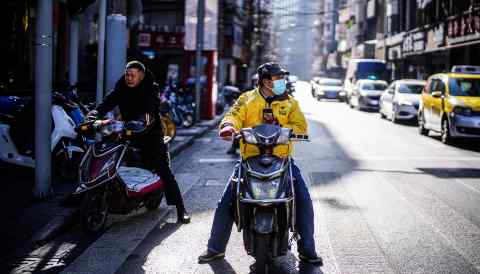DAEGU, South Korea -- The last time Park Mi-suk and Jang Gwang saw their son alive, he was leaving their family's apartment on a Sunday evening to catch the company shuttle bus, bound for an overnight shift at his job packing parcels.
Their son, Jang Dug-joon, had worked for 16 months at a fulfillment center operated by Coupang, a South Korean e-commerce giant. Jang was interested in technology and had graduated university with a degree in robotics -- but, unable to find work in the field, he had decided to take up a casual job.
The warehouse he worked at is one node in a nationwide network that allows swift delivery of everything from milk and eggs to furniture and electronics. There, in an industrial area outside of the city, Jang worked long hours on his feet, procuring boxes and plastic padding for deliveries.
His hometown is Daegu, a city of 2.5 million. In February 2020, it became the epicenter of the first wave of the coronavirus in South Korea, and the site of the second-largest outbreak in the world after the Chinese city of Wuhan. Things moved quickly: Strict social distancing was enforced, and employment became precarious as countless street-level businesses shut their doors. The volume of packages Jang handled during a shift ballooned, as consumers turned away from bricks-and-mortar stores.
"When he started working there, we were happy, because Coupang is a big company that is doing really well nowadays, so we thought it was a good opportunity," Jang Gwang told Nikkei Asia in an interview at the family's home.
Dug-joon's parents say the start of the pandemic was also the start of a permanent deterioration in their son. Working long hours at his physically strenuous job, particularly through South Korea's hot, humid summer, they say he lost around 15 kg and needed to replace many of his clothes, which now hung off his body. His face narrowed from the weight loss, and the normally energetic and optimistic young man seemed listless.
He worked seven days straight over Chuseok, one of South Korea's main holidays -- a peak period for the logistics industry, when it floods with family and friends sending gifts of fresh fruit and other food items across the country.
After returning home in the morning, he would bathe and go to bed, around the time his parents and two younger siblings were waking up. At around 6 a.m. on Oct. 12, Jang's parents found him unresponsive in the bathtub in their home, shortly after he returned from work. He was dead at age 27.
His parents maintain that their son did not smoke or drink and had no underlying health problems. The week he died, Dug-joon was organizing a family vacation to celebrate his mother's upcoming birthday. They attribute his death to the physically onerous work he did at the Coupang warehouse, specifically to a workplace atmosphere where every second counted toward making snap deliveries on time.
"He worked like a machine," Jang, his father, said.
Coupang denies that Jang Dug-joon's death was related to his work and claims to maintain exemplary conditions in its workplaces. As his death made national headlines, the company released a statement saying that, although Dug-joon's status as an irregular worker exempted him from the legal limit of 52 hours of work per week, Coupang nonetheless monitors such workers' hours to ensure they remain below the legal limit.
Coupang claims that temporary workers have the right to choose their own work schedules and that, in the weeks leading up to his death, Jang worked an average of 44 hours per week. His parents believe it was more, and have asked Coupang for records of their son's hours.
The company denies that its business model exploits its workers. "We built our technology because we wanted to help our employees. We made a huge investment in the infrastructure as well. Of course, we want to lessen the amount of work people handle, but at the same time we want to automate the process whenever possible to make every aspect efficient which benefits customers and our drivers," Coupang told Nikkei.
"The high volume of deliveries won't be solved through individual effort, but through good planning and programs at the company level. That's why we continue to invest in the software and technology and intend to hire more delivery drivers as permanent employees this year to meet the demand without overworking our employees."
Coupang and other delivery companies across Asia have seen their fortunes rise, as the coronavirus pandemic made them an indispensable lifeline for the homebound. For most e-commerce companies in Asia, 2020 was a year of possibilities -- many saw their delivery volumes grow by a quarter or half in a year, and enjoyed a proportionate-or-higher jump in share prices or valuations.
That capped off a decade of high growth for the industry. E-commerce has already been a singularly successful model in Asia, due partly to the exceptional cheapness of the delivery. In the U.S. and Europe, delivering lunch costs about $6-$7, while the equivalent service in Indonesia or China is $1-$2.
Asia's uniquely efficient logistics industry, fueled by a huge pool of cheap labor, has aided in the success of Alibaba Group Holding, JD.com and Meituan in China; Grab, Gojek, Tokopedia and Sea Limited in Southeast Asia; Amazon and Rakuten in Japan; and Coupang in South Korea.
But the delivery industry is a microcosm of the economic inequalities that have been exacerbated by the pandemic. The boom in the digital economy has been made possible by what some say is an unsustainable strain on the foot soldiers in their logistics networks. Drivers and stockers have been subject to brutally long hours, an increase in road traffic accidents, not to mention the ever-present danger of exposure to COVID-19.
Dug-joon's death highlights the plight of workers in this tech underclass. In South Korea, there have been several other reports of logistics workers dying from cardiovascular ailments, events which labor groups attribute to excessive physical work. The other deaths were of delivery drivers, with advocates contending that with parcel volumes increasing and companies competing to offer the fastest, cheapest deliveries, workers were forced to work long days without time to properly rest.
"There have been 15 deaths officially counted as caused by overwork, but if you factor in all the unofficial early deaths, people dying because of the hazards of their jobs, it's probably double that," said Yang Dong-kyu, a union organizer who works for the Korean Confederation of Trade Unions, a left-wing umbrella group.
"Our government boasts about [gross domestic product] growth, and belonging to the G-20 and Organization for Economic Cooperation and Development, but they've never addressed this harsh reality," Yang said.
Cost of convenience
Across Asia, the story is the same. Many workers complain of impossibly long hours, the rising danger of traffic accidents as they are pushed to deliver ever faster, and the fear of catching COVID-19. At the same time, they have little choice. Many concede they are lucky to have a job at all.
Couriers are frequently not employees but "partners," in many cases even lacking contracts. They drive with one hand on the steering wheel or bike handle, and one hand on their phone. Their boss is often an app, which continuously updates its algorithms to work them harder. The ultimate beneficiaries of their labor -- the unicorns, decacorns, and publicly listed e-commerce companies -- are at several arms' lengths distance.
Meanwhile, as their workload has risen, their underlying pay has declined, as the calculations that route them to packages and food delivery are optimized to squeeze out ever more deliveries. In late October, the National Human Rights Commission of Korea released a statement saying that delivery drivers worked an average of 71.3 hours per week, which the commission described as "the international standard of 100 years ago."
Even before the pandemic, cutthroat competition in the logistics industry had driven down wages per delivery, according to the National Logistics Information Center, a South Korean government body. The average unit price of a parcel delivery was 2,269 Korean won ($2.05) in 2019, down from 2,506 ($2.27) in 2012.
The pandemic has further warped this ratio. Package volume in South Korea rose 20% in the first eight months of 2020, and 31% in China for 2020, while total e-commerce transactions have grown 52% in Indonesia last year. However, per-package earnings by couriers actually fell in several countries, according to labor rights agencies and anecdotal data from couriers themselves.
Despite the heightened urgency of their services, couriers from Jakarta to Shanghai all report having to work longer hours to make the same -- or, in many cases, less -- money than a year ago. In Indonesia, couriers are being told to register for social services to make up for low pay, even as the unicorns that they work for see earnings and valuations rise precipitously.
In Jakarta, motorbike couriers say they are increasingly squeezed by doing food delivery, which requires long wait times for clients. Pre-pandemic, many acted as motorcycle taxis, which was more lucrative.
"Before the pandemic, we worked between 8 and 12 hours on average ... and can easily get more than 20 orders. Now, maybe around 10 to 15 hours per day, for less than 20 orders," said Igun Wicaksono, chairman of the Two-Wheeled Action Association, or Garda, an association whose members are comprised of 100,000 Gojek and Grab drivers nationwide.
"We used to earn between 300,000 and 400,000 rupiah ($21 and $28) per day. Now, during the new normal, it's just 150,000 to 250,000 rupiah per day. Our net income is only around 30% [of those amounts]."
Under "partner" status, most of the drivers are not covered by any insurance, he added.
Read more from Jakarta here.
In China, meanwhile, recent deaths of workers have rekindled discussion on the grueling conditions of its internet platforms. On Dec. 21, a food deliveryman known as Han, who worked for Alibaba subsidiary Ele.me, died suddenly while delivering his 34th order for the day.
The company told Han's family it was willing to pay 2,000 yuan ($307) -- out of compassion, as Han was not directly employed. Like many deliverymen, he worked with a subcontractor.
The news provoked heated discussion on social media, prompting Ele.me to make an apology on Jan. 8 and increase the payout to Han's family. They received 600,000 yuan from the company's special pension fund, which draws a 3-yuan contribution from each courier daily.
It did not end there. On Jan.11, another Ele.me deliveryman immolated himself in front of his work station in Taizhou City. The act was recorded on smartphone camera and posted on Weibo, the Chinese social media platform. He was rescued by passersby, and could be heard saying: "I want my hard-earned money."
Unequal gains
The value created by couriers is mainly accruing to a slew of e-commerce companies that are seeing share prices and valuations ramp up along with delivery volumes.
Coupang, a privately-held e-commerce company backed by SoftBank, has been on an expansion drive during the pandemic, launching same-day grocery delivery for its "Rocket Wow" paid membership service. It has also been aggressively expanding its food delivery business.
In the first quarter of 2020, Coupang became the largest online retailer by transaction value, boosting its market share to nearly 25%, according to local media. One source said it is increasingly a growing threat to major offline retailers like Lotte Shopping.
While it has not released financial results for 2020, the privately-held company's shares have been trading recently in private markets at a valuation of $30 billion, according to a person close to the company, up from a $10 billion valuation during its last funding round in 2018. That will mean a huge windfall for SoftBank, which invested $3 billion in Coupang between 2015 and 2018.
South Korea's logistics market is dominated by a few large companies, and Coupang is a relative newcomer, having launched in 2010. Coupang is distinct from the older players -- CJ Logistics, Lotte Globis and Hanjin Express -- in that its drivers are hired as full-time employees. That status means that delivery drivers, which the company calls "Coupang Friends," are subject to the legal limit of 52 working hours per week and receive employment benefits, such as insurance and paid leave.
As couriers became the circulatory system of the pandemic economy last year, their deaths received broad media attention and spurred outpourings of sympathy. However, it is unclear how many South Koreans are prepared to cede the convenience of speedy delivery. The results of a survey conducted in late October by polling firm RealMeter showed 65% of respondents agreeing that courier companies ought to immediately hire more workers to improve conditions for drivers. However, only 27% of respondents to the same survey said that consumers ought to accept delayed deliveries as a consequence of that improvement.
In his five years as a delivery driver for CJ Logistics, Park Seung-hwan has seen his own days grow longer and more strenuous as more South Koreans became accustomed to the convenience of cheap delivery. Park, 35, is legally classified as an independent contractor, meaning that unlike Coupang Friends, his working hours are not capped and he has no guaranteed minimum wage.
He leaves home every morning at 7 a.m. After arriving at the warehouse on Seoul's southern outskirts, he sorts packages and loads his truck until around 1 p.m. then heads out on his delivery route composed of office buildings in a high-rent part of the city's Gangnam area. He usually wraps up his deliveries around 5 p.m., then goes picking up packages that clients want sent to another part of the country.
He returns to the terminal, feeds those packages into the system, and finishes work at 9 or 10 p.m.
On Oct. 14, a CJ delivery driver named Kim Won-Jong collapsed on the job and later died in hospital. Several days later, with the company facing a firestorm of public criticism, CJ Logistics CEO Park Keun-hee held a press conference where he apologized for Kim's death and said the company would take steps to improve working conditions for drivers and prevent any other deaths, including the hiring of 4,000 workers to sort packages for drivers, work that has fallen to the drivers but for which they were not paid.
Nikkei has contacted CJ Logistics seeking comment.
"What makes me sad and angry is that anyone could have seen this coming but no one took steps to prevent it," Park Seung-hwan said of the string of deaths in the industry. "Starting last year, the volume of deliveries started to go up, but the companies didn't take measures to deal with that. Drivers were just left to deal with it without support."
Read more from Shanghai here.
Workers are extra careful about possible virus infection, knowing that the nature of their job exposes them to many people and an infection could cause a shutdown of their fulfillment center and leave them all without an income, adding that the constant wearing of masks has lent a veneer of anonymity to the job, making it more difficult to recognize colleagues in warehouses or when passing each other on the street.
'This is the country you've made'
Experts argue that the South Korean government must take steps to more tightly regulate the delivery sector. "Hiring workers to take care of the sorting is not a fundamental solution to that, because they are mainly irregular workers," Lee Byoung-hoon, a professor and expert on industrial relations at Chung-Ang University, told Nikkei.
"The next step is for the government to create a body for dialogue between the logistics companies, online companies, delivery drivers and unions, to hold discussions toward some kind of lasting solution," Lee said.
"To mitigate the problem of delivery fees and drivers' deaths by everyday mandatory overwork, we need to legislate a minimum wage system for drivers," said Kang Kyung-woo, a professor in the Department of Transportation & Logistics Engineering at Hanyang University.
In late November, union activists held a demonstration outside the office's of the ruling Democratic Party, where they arranged dozens of white plastic chairs on the road, each bearing the name and details of South Koreans who had died in industrial accidents.
Kim Mi-sook, mother of Kim Yong-kyun, a man in his early twenties who died in 2018 while working at a coal power plant, took the microphone. Kim died after falling onto a conveyor belt and being crushed while working alone on a night shift. Union advocates claimed that his employer had compromised his safety by leaving him alone, instead of working with a partner who could have pushed a button to stop the conveyor belt after he fell, thereby saving his life.
Since her son's death, Kim has become a recognizable activist calling for legislation to improve worker safety. After tearfully sharing her feelings of the upcoming second anniversary of the loss of Yong-kyun, Kim alluded to the recent deaths of delivery drivers, looked to the Democratic Party office, raised her voice and said, "This is the country you've made. You promised to improve this situation. Are you somehow not responsible for these deaths?"
There are signs that the government and companies are responding to the pressure. In December, the National Assembly passed legislation to provide government employment insurance to delivery drivers. On Jan. 21, with government mediation, logistics workers reached an agreement with companies to reduce drivers' workload whereby companies agreed that drivers would no longer be responsible for the time-consuming task of sorting parcels.
Companies also agreed to cap drivers' working hours at 12 hours per day and 60 hours per week, while minimizing deliveries after 9 p.m.
At a press conference announcing the agreement, the union representing delivery drivers thanked the public for support, saying that souring public opinion had pressured the companies to institute changes drivers had been demanding for years.
Dug-joon's family are still seeking answers related to his death. They have applied to the government to have his death recognized as an industrial accident and are awaiting results of an autopsy.
The family is slowly clearing Dug-joon's belongings out of his bedroom. His books still line the shelves and his clothes are still in the closet. Among them are two pairs of jeans, one a medium, the other a small that Dug-joon had to purchase as he lost weight over the summer.
"Some of his things were too painful to look at it, like the photos of him, so I had to put them somewhere I couldn't see them," Park, his mother, said.
Park says that her son's death has led her to change how she thinks about a pillar of South Korean society: the belief that diligent effort will lead to success. "We were raised to just work hard, and believed that if we did that, good things would happen. So we told our kids that if they worked hard like we did, good things would happen for them," she said.
Additional reporting by Erwida Maulia in Jakarta, CK Tan in Shanghai, and Wataru Suzuki in Tokyo























